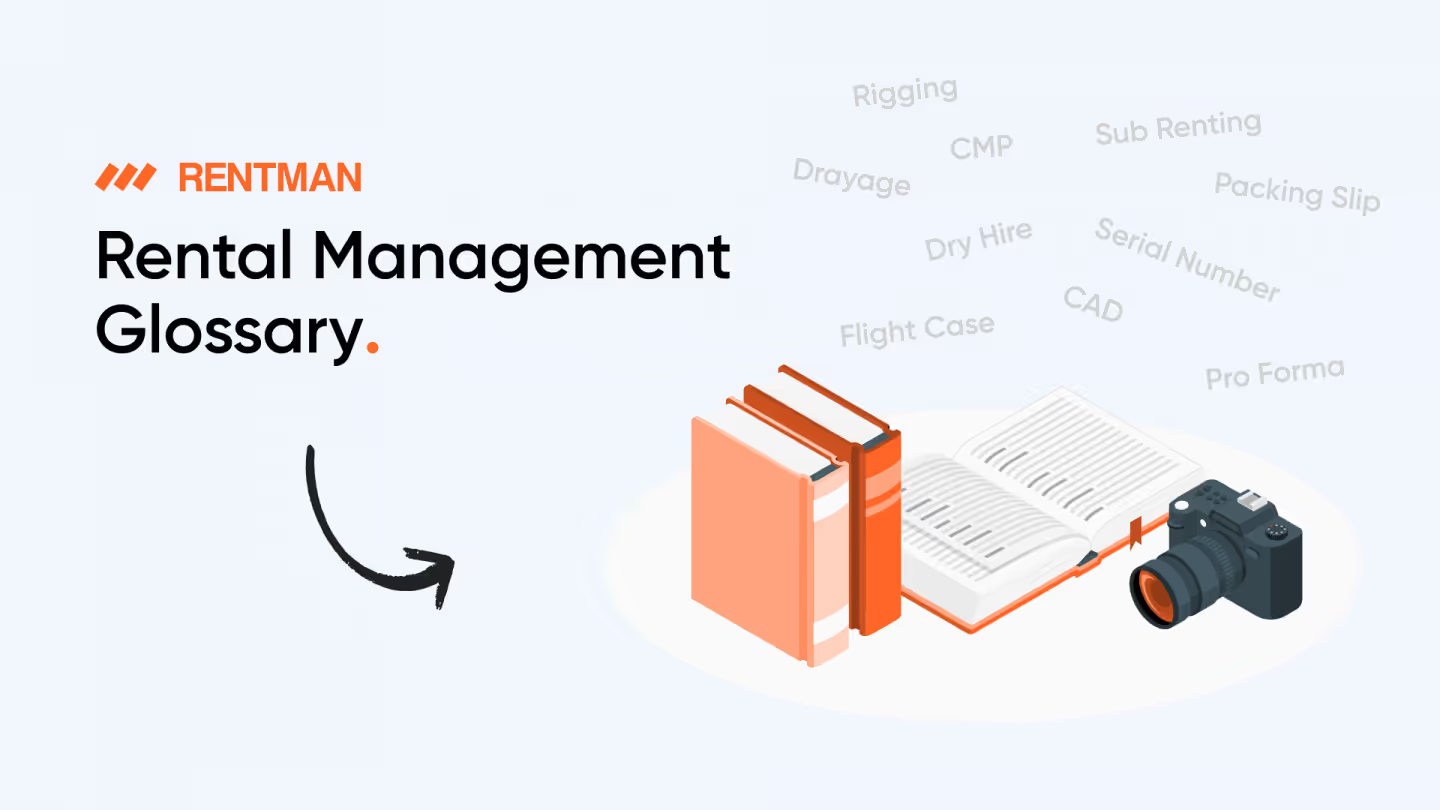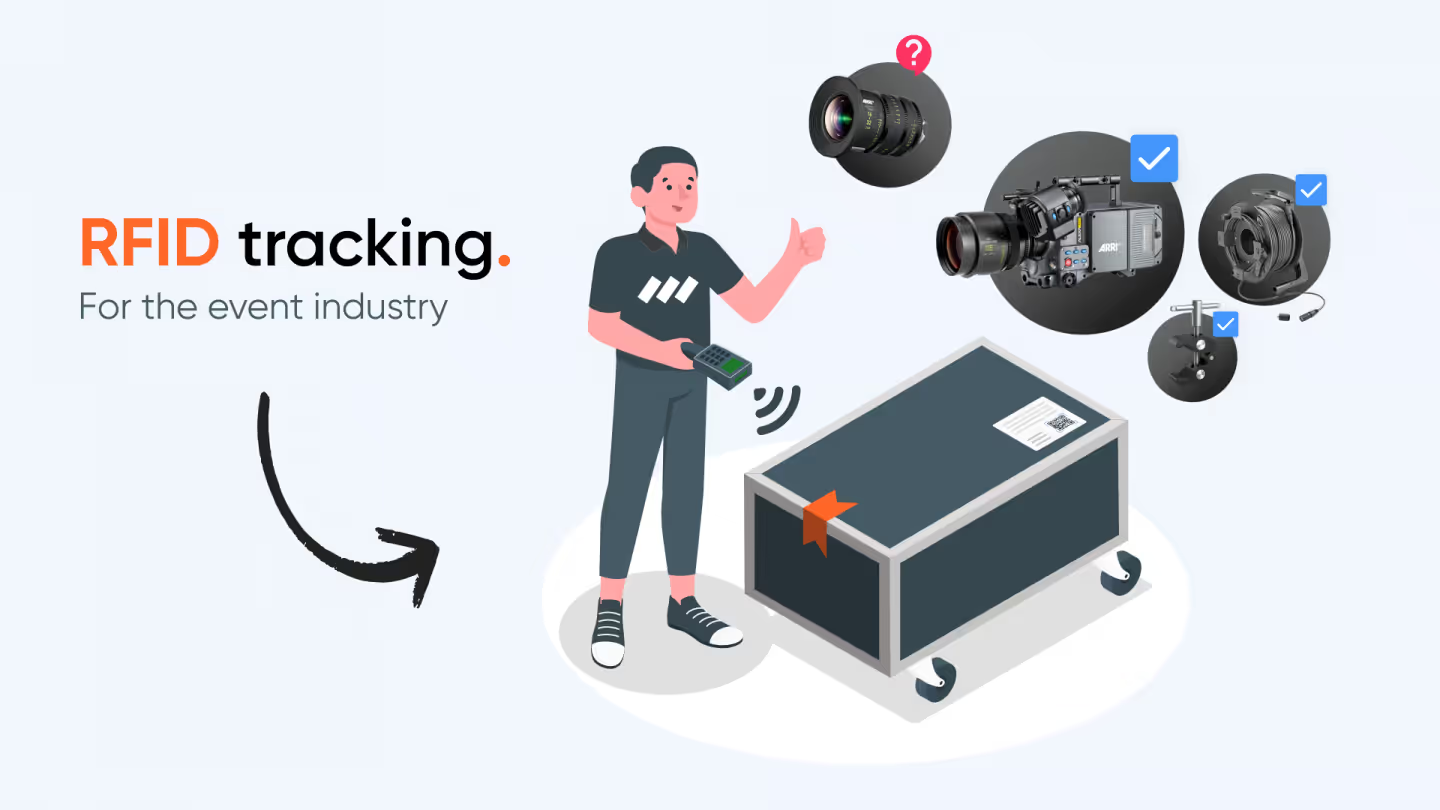Rental Management Glossary

Whether you're an event planner or a rental business owner, this glossary provides clear definitions of key terms and concepts in the rental management industry.
Bookmark it, share it, and use it as a reference guide to enhance your understanding of live-event rental management terminology!
Use this menu to quickly find what you're looking for.
# A B C D E F I L M N O P Q R S T U W
#
2-Way Moving Assets
Equipment that's moving from an event straight back to the warehouse
3-Way Moving Assets
Equipment that's moving from an event to a Quality Control center before returning to the warehouse.
A
AV Equipment
Audio-visual equipment used for events, such as speakers, microphones, projectors, screens., etc.
Amenities
Additional features or services provided to enhance live-event experience, such as catering, decorations, or entertainment options.
Attrition Rate
The rate at which customers or clients are lost over a specific period, often measured as a percentage.
B
Barcode
A code that can be read by machines and consists of numbers and a pattern of parallel lines with different widths. It serves as a unique identifier for inventory management, enabling efficient tracking and streamlining of operations in the industry.
Bid Document/Tender
A formal document that outlines the requirements, specifications, and terms for vendors to submit their proposals or bids for a rental project.
Blackout Date
A date or period during which an event venue or service is not available for booking or reservation.
Book Value
An accounting measure to determine the value of an asset for financial reporting purposes. The book value is calculated by subtracting the accumulated depreciation from the initial purchase price of the asset.
C
CAD Renderings
Computer-Aided Design renderings, which are digital representations or visualizations of party setups or designs.
Call Sheet
A document used in the rental industry that provides important information to event staff and crew. It includes details such as event date, time, location, contact information, schedule, and specific instructions to ensure smooth coordination and execution of the event.
Cancellation Clause
A clause in a contract that specifies the conditions and consequences for canceling rental booking or agreement.
Carnet
A document or permit that allows the transportation of rental equipment or materials across borders without the need for customs duties or taxes. It serves as a temporary import-export license and facilitates the smooth movement of rental supplies for events held in different countries.
Container Label
A physical tag or sticker attached to a container in the rental management industry. It typically contains essential information such as the container's identification number, contents, destination, and handling instructions.
Container Slip
A document used in the rental management industry to provide detailed information about the contents of a container. It includes a list of items, quantities, descriptions, and any relevant instructions for efficient handling and tracking during transportation or storage.
Charter
Renting a vehicle, such as a bus or boat, exclusively for a specific group or event.
CMP - Certified Meeting Professional
A recognized certification for professionals in the meeting, events, and conventions industry.
D
Depreciation
The decrease in the value of rental equipment or assets over time due to wear and tear, aging, or obsolescence.
DDR - Day Delegate Rate
A pricing structure or package that includes various services and amenities for a full day event or conference.
Drayage
The transportation of rental equipment or materials from one location to another, often involving loading, unloading, and storage.
Dry Hire
The rental of event equipment or items without additional services or provisions, such as staffing or setup.
DMX Control
A standard protocol for controlling and programming lighting and special effects equipment in the AV rental industry.
E
EDT - Estimated Departure Time
The anticipated time at which equipment or resources will leave a specific location.
ETA - Estimated Time of Arrival
The expected time when equipment or resources will arrive at a designated location.
Event Production
The overall process of planning, coordinating, and executing an event, including logistics, technical requirements, and aesthetics.
Event Signage
Visual displays, banners, or boards used to provide information, directions, or branding at events.
Electronic Signature
A digital or electronic form of signing documents or contracts, often used to streamline and expedite rental agreements.
Equipment Group
A classification or categorization of similar types of equipment or assets that are offered for rental. Equipment groups are typically created to simplify inventory management, streamline rental operations, and facilitate customer inquiries and bookings.
Equipment Rental Agreement
A formal contract that outlines the terms, conditions, and responsibilities regarding the rental of equipment.
Equipment Rental Software
Software or a platform that allows event rental businesses to manage and streamline bookings and stay in control of their rental equipment.
Equipment Tracking
The process of monitoring and recording the location, status, and usage history of rental equipment.
Equipment Management
The systematic approach to oversee and maintain rental equipment, including repairs, maintenance, and replacement.
F
Factor
A metric that is used to calculate a rate for a usage period longer than 1 day.
Flight Case
A protective container specifically designed to securely transport and store fragile or valuable equipment used in the rental industry, such as audiovisual gear or event production equipment.
Force Majeure Clause
A contractual provision that addresses unforeseen events or circumstances beyond the control of the rental business, such as natural disasters or government actions.
Function Group
A category or classification of rental items or equipment based on their specific purpose or intended use. For example, within the event rental industry, function groups may include a seating and furniture group, audiovisual group, or catering and food service group.
I
Interactive Technologies
Technological solutions or tools that engage and involve participants or attendees at events, such as interactive displays, touchscreens, or virtual reality.
Inventory Counting
The process of regularly and systematically counting and verifying the inventory stock levels to maintain accuracy and prevent discrepancies.
Invoice
A document provided to the client or customer that itemizes the services rendered and costs associated with a rental booking.
Inquiry
A customer's initial request or communication seeking information about the availability, pricing, terms, or other details related to renting a specific item or service.
L
Lead Time
The amount of time required between receiving a rental booking request and the actual event date.
Liability Insurance
Insurance coverage that protects the rental business from potential financial losses or claims due to property damage or personal injury.
M
Master Account
An account or billing arrangement that consolidates charges and payments for multiple event rental services or bookings.
MICE
Meetings, Incentives, Conferences, and Exhibitions/Events, a term used to describe the business events and conference industry.
N
NFC - Near Field Communication
The technology is used for wireless communication between devices in close proximity. It allows seamless data transfer, such as sharing rental information or processing payments, by simply tapping or bringing NFC-enabled devices, such as smartphones or tablets, close to each other.
O
OHP - Overhead Projector
A device used to project images or content onto a screen or surface during a live-event presentation.
Overnight Rental
The rental of party equipment or spaces for an extended period that includes overnight usage.
Outsourcing
Engaging external parties or vendors to provide specific services or tasks for the event rental business, such as event planning, marketing, or equipment maintenance.
P
Packing Slip
A document that provides a detailed list of the rented items and is included in the shipment.
PA System
Public Address System, equipment used to amplify and distribute sound or announcements during live events.
Pay-Per-Use
A pricing model where the rental business charges customers based on their actual usage or consumption of services or resources.
Planned Availability
The quantity of rental items that is available at a given time according to planning. This number takes into account the unavailable equipment due to repairs; it doesn't include the reservations.
Planning Period
The time in which equipment or resources are marked unavailable except for the project it's planned on.
Pre-Production
The planning and preparation phase before an event, including tasks such as logistics, equipment setup, and content creation.
Pro Forma Invoice
A preliminary or estimated invoice provided to the client or customer before the completion of an event rental service.
Post-Event Report
A comprehensive summary or analysis of an event, including attendee feedback, performance metrics, and recommendations for improvement.
Post-Production
The phase after an event, involving tasks such as video editing, content distribution, and archiving.
Power Management
The effective utilization and distribution of electrical power resources for rental equipment, optimizing energy efficiency and reducing costs.
Q
Quotes
Estimates or proposals provided to clients or customers detailing the pricing, services, and terms for an equipment rental booking or event production.
QR
A two-dimensional barcode that is used in the rental management industry to store and retrieve information quickly. It can be scanned using a smartphone or a dedicated QR code reader, providing instant access to details such as rental item specifications, pricing, or website links.
R
Rental Request
A formal inquiry or submission from a client or customer expressing interest in renting event equipment or services.
Rental Shortage
The situation where a rental business does not have enough available equipment or resources to fulfill all booking requests or demands.
Repair
A piece of equipment that is in a condition that is undesired. This doesn't necessarily mean that the item cannot be used, but it doesn't meet the standards that have been set for rental equipment.
RFID - Radio Frequency Identification
A technology that uses radio waves to identify and track rental equipment or assets.
Rider
Additional terms, specifications, or requirements added to a contract or agreement for a rental service or booking.
Rigging
The process of installing and securing lighting, sound, or decorative elements at event venues or spaces.
RTMP - Real-Time Messaging Protocol
A protocol used for streaming audio, video, or other media content during events.
S
Serial Numbers
Unique identification numbers assigned to individual rental equipment or assets for tracking and inventory management purposes.
Stock Locations
Designated areas or storage locations where rental equipment or inventory is stored, organized, and managed.
Storage Location
A designated area or facility where rental items are securely stored when they are not in use or awaiting rental. Depending on the scale of a rental business, this could be a warehouse or a storage unit.
Sub Renting
The practice of renting party equipment or resources from another rental business to fulfill specific client requests or temporary shortages.
Sub-Project
A distinct set of activities, resources, and timelines that contribute to the overall success of the main project. Sub-projects are commonly used to manage and track various aspects of complex events, ensuring effective coordination and organization.
System Integration
The process of connecting different software systems used for managing various aspects of rental operations, such as inventory management, customer relationship management, and accounting.
T
Time Registration
The process of tracking and recording the working hours or time spent by staff or crew members on event productions.
Time Schedule
A detailed and specific plan that outlines the exact dates and times when rental items are reserved, delivered, utilized, and returned. Rental businesses use this to ensure efficient coordination of resources, meet customer expectations, and avoid scheduling conflicts or double bookings.
TCO - Total Cost of Ownership
A comprehensive calculation that considers the total expenses associated with rental equipment or technology throughout its lifecycle.
U
Usage Period
The period equipment and/or resources are charged for.
W
Warehouse
A facility or storage space where event rental equipment, inventory, or supplies are stored, organized, and managed.
Warehouse Stock
Stock levels of equipment that can be found in a warehouse with reservations taken into account. Equipment in repair would still be considered part of the warehouse stock, as it can be found in the warehouse.
Waiver
A legal document or agreement that releases the rental business from liability or responsibility for certain risks or incidents associated with the rented equipment or services.
---
Note!
As the industry is changing, we will regularly update this glossary, so make sure you have the latest version. If you have any further questions, feel free to contact us!
Version: 23.7
Frequently asked questions
Do you want to keep a copy of this glossary?
Previous blog posts

Understanding RFID tags in the AV industry: types, uses, and security concerns
Understanding RFID tags in the AV industry: types, uses, and security concerns
A complete guide to RFID - What is it, and how does it work?
A complete guide to RFID - What is it, and how does it work?

